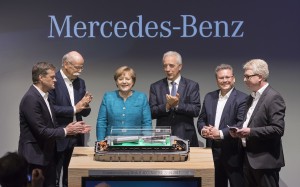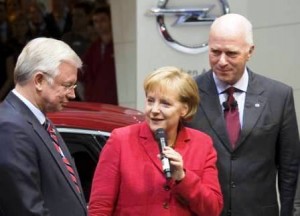
German Chancellor Angela Merkel is struggling to find ways to appease the Green Party and automakers.
Tighter rules on auto emissions is emerging as a key issue as German Chancellor Angela Merkel works to assemble a governing coalition, following her election in September.
One of the key components of Merkel’s proposed coalition is Germany’s Green Party, which emphasized this week that the Chancellor’s new government will have to agree to make carmakers introduce mechanical changes to engine and exhaust systems to cut toxic emissions, something Germany’s big carmakers have resisted.
Transport is among the policy areas being thrashed out in talks taking place between Chancellor Angela Merkel’s conservatives, the pro-business Free Democrats, and the Greens, who are aiming to form a coalition by Christmas, according to Reuters.
The emergence of the Greens as likely powerbrokers in a future German government coalition could spell bad news for the country’s struggling car and coal power industries.
(Germany could be next country to phase out internal combustion engine. For more, Click Here.)
The Greens began pressing for their key policy demands on the energy and the autos sectors, which is grappling with diesel emissions scandal, which began with Volkswagen and also spread to other carmakers.
Among their policies, the Greens hope to ban the sale of new combustion-engine cars from 2030 – a decade earlier than plans already outlined in France and Britain.
“On the whole, the Greens pursue more ambitious goals and a more radical response to the diesel scandal,” Morgan Stanley analysts noted in recently. The Greens are also calling for a quick phasing out of coal power plants and their complete closure by 2030.
Merkel has tried to finesse the automobile issue and Germany’s carmakers have agreed to overhaul engine software on 5.3 million diesel cars to cut pollution and avoid bans on polluting vehicles. But they have stopped short of committing to more expensive hardware modifications.
The Greens, however, want more than software change in the engine controls.
(Click Here for more on the proposed UK ban.)
“We won’t meet our targets of getting cleaner air in city centers with software upgrades alone,” Cem Ozdemir, a leader of the Greens told reporters in Berlin this week. “There must also be hardware solutions,” he said.
Ozdemir said the auto industry was going through a major crisis and the car had to be reinvented to make it emission-free and more automated. Public transport must also be expanded, he added.
The conservative bloc, comprising Merkel’s Christian Democrats and Bavaria’s Christian Social Union, oppose any demand to ban the combustion engine in 2030.
With the three parties expected to begin negotiations for a broad left-right coalition in the coming weeks, Greens told Clean Energy Wire that they were optimistic they could find common ground, despite major ideological differences.
Oliver Krischer, vice chairman of the Greens’ parliamentary group, said the Greens were determined the coalition talks to form Germany’s next government will be a success. He accepted compromises must be found in all policy areas, but stressed the Greens would be particularly adamant over climate and energy policy.
(For more on France’s proposed ban of gas and diesel vehicles, Click Here.)
“Every one of the parties has committed itself to the aims of the Paris climate agreement. That’s a good starting point,” said Krischer, who also served as his party’s climate and energy spokesman.


“Merkel” and “Conservative” should not appear in the same sentence. She’s as far Left as possible.